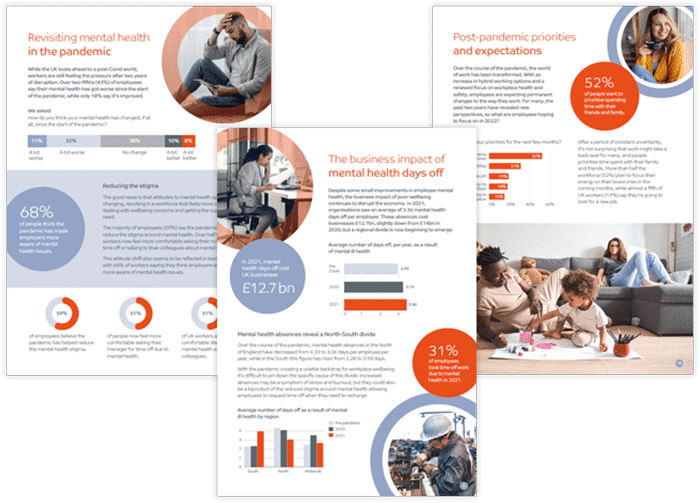Our latest report, Our Changing Attitudes to Mental Health, reveals how the pandemic continues to impact the nation’s wellbeing, with nearly half (43%) of workers saying that their mental health has declined since the start of the pandemic.
In the past year, almost one in three (31%) employees have taken time off due to poor mental health, at a cost of £12.7bn to UK businesses. And now these findings are beginning to reflect inequalities between the North and South of England, both in terms of mental health absences and attitudes to workplace wellbeing.
Mental health in the North and South of England
In 2021 we began to see a divide appearing in terms of workplace mental health. More people in the South of England say their mental health has got worse since the start of the pandemic (46%) compared to those in the North (39%). Workers in the South have also been more concerned about losing their job this year, with 46% saying this is a worry compared to 32% in the North.
This has resulted in people in the South taking more time off on average (3.98 days per year) due to mental health than those in the North (3.06 days per year). Compared to 2020, the figures in the South have increased (from 2.33 days) while they’ve decreased in North (from 4.10 days).
A positive attitude shift
On the upside, the discussion around mental health and wellbeing is improving, especially for those in the South of England. Those in the South are more comfortable with asking for time off due to mental health (55% vs 48% in the North) and are also more likely to discuss their mental health with colleagues (57% vs 46% in the North).
This makes it unclear whether the increase in mental health absences in the South is due to deteriorating mental health or rather because employees feel more comfortable taking time off when they need to recharge. Employers therefore need to consider how mental health is impacting their people not just by monitoring absence rates, but also through qualitative feedback such as pulse surveys and conversations with different departments. Each workplace culture is unique, and line managers are often best placed to get a feel for how individuals in their teams are coping in the post-Covid workplace.
Looking after employee wellbeing
So what changes do workers want their employer to make to better support their wellbeing? Over a quarter of employees are looking for long-term changes to the way they work (28%), extra wellbeing support (27%) and mental health support at work (25%).
After two years of uncertainty, people’s priorities and expectations around employer support have changed drastically. What people need most is to be heard and to feel that their individual needs are understood. Now is the time for employers to think about how they can help their people, being careful not to become complacent with wellbeing support as restrictions ease.
Being flexible in their approach will help HR teams to ensure that they are listening to their people’s changing needs and can quickly adapt to any future mental health challenges. Employees will now expect their managers to build strong relationships and encourage open communication about their health needs.
Read the full report for free
Read the full report, Our Changing Attitudes to Mental Health, to find out more about how mental health is continuing to impact employees in the post-Covid workplace, including a more detailed breakdown of the North-South divide.
